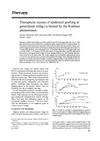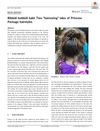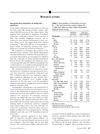5 citations,
August 2015 in “Sultan Qaboos University medical journal” Vitamin B12 deficiency can cause skin darkening and other symptoms, which improve with B12 supplements.
[object Object] 3 citations,
June 2020 in “Journal of Dermatological Treatment” Triamcinolone acetonide is slightly more effective than betamethasone for hair regrowth in localized alopecia areata.
November 2015 in “Australasian Journal of Dermatology” Lichenoid keratosis can cause localized hair loss.
 84 citations,
January 1990 in “Journal of The American Academy of Dermatology”
84 citations,
January 1990 in “Journal of The American Academy of Dermatology” Skin grafting can help repigment vitiligo, but it's less effective for widespread cases due to the Koebner phenomenon.
 2 citations,
April 2018 in “Pediatric dermatology”
2 citations,
April 2018 in “Pediatric dermatology” Elaborate princess hairstyles at a theme park caused hair loss and scalp damage in young girls.
 32 citations,
February 1998 in “The journal of investigative dermatology/Journal of investigative dermatology”
32 citations,
February 1998 in “The journal of investigative dermatology/Journal of investigative dermatology” Two specific hair keratin genes are active during hair growth and decline as hair transitions to rest.
1 citations,
September 2021 in “Pharmaceutics” High-dose finasteride may help treat glioblastoma but needs localized delivery for effectiveness.
 16 citations,
December 2012 in “The Clinical Journal of Pain”
16 citations,
December 2012 in “The Clinical Journal of Pain” Chronic scalp pain in trichodynia involves both body-wide and localized increased pain sensitivity.
 September 2024 in “Egyptian Journal of Dermatology and Venerology”
September 2024 in “Egyptian Journal of Dermatology and Venerology” Combining TRA and latanoprost is most effective for treating localized alopecia areata.
 7 citations,
October 2017 in “The Prostate”
7 citations,
October 2017 in “The Prostate” Baldness in men with prostate cancer is linked to higher levels of certain sex hormones, but chest hair density is not.
 July 2002 in “Australasian Journal of Dermatology”
July 2002 in “Australasian Journal of Dermatology” A woman with lupus had hair loss and skin issues that were successfully treated with medications.
11 citations,
August 2016 in “Journal of the European Academy of Dermatology and Venereology” Serial trichoscopy is more reliable than the modified hair pull test for tracking alopecia areata.
11 citations,
January 2013 in “International Journal of Trichology” Emotional factors are crucial in treating and preventing scalp neurodermatitis and hair loss.
October 2024 in “Journal of Dental Sciences” Effective treatments for discoid lupus erythematosus are needed, as current options are unsatisfactory and off-label.
17 citations,
January 2019 in “Journal of cutaneous medicine and surgery” JAK inhibitors show promise for treating hair loss in alopecia areata but need more clinical trials to confirm safety and effectiveness.
Discoid Lupus Erythematosus is more common in women aged 31-40, often worsened by sunlight, and confirmed by specific lab tests.
 192 citations,
March 2017 in “Cell host & microbe”
192 citations,
March 2017 in “Cell host & microbe” Hair follicle development and microbes help regulatory T cells gather in newborn skin.
April 2022 in “JAAD case reports” Alitretinoin helped clear up a skin condition called generalized granuloma annulare in an elderly man.
 28 citations,
July 2002 in “Australasian Journal of Dermatology”
28 citations,
July 2002 in “Australasian Journal of Dermatology” Lupus can look like hair loss from alopecia areata but needs different treatment.
January 2022 in “Clinical Cases in Dermatology” A 22-year-old man has alopecia areata, an autoimmune hair loss condition, with various treatments available.

Traumatic anserine folliculosis is a harmless skin condition in young males that needs correct diagnosis to avoid unnecessary treatments.
 20 citations,
January 2012 in “International journal of trichology”
20 citations,
January 2012 in “International journal of trichology” Steroids are the best treatment for Alopecia Areata with few side effects.
8 citations,
May 2005 in “Australian veterinary journal” A Tibetan Terrier had recurring seasonal hair loss for three years.
 1 citations,
September 2007 in “European journal of paediatric neurology”
1 citations,
September 2007 in “European journal of paediatric neurology” Low dose valproic acid treatment caused hair loss in a young patient.
September 2021 in “CRC Press eBooks” Dissecting cellulitis of the scalp is a condition that causes inflammation and scarring on the scalp, mainly affecting African-American men, and can lead to permanent hair loss.
 97 citations,
September 2011 in “British Journal of Dermatology”
97 citations,
September 2011 in “British Journal of Dermatology” The human hair follicle can store topical compounds and be targeted for drug delivery with minimal side effects.
 2 citations,
March 2023 in “Skin research and technology”
2 citations,
March 2023 in “Skin research and technology” Temporal triangular alopecia in infants is mostly seen in males at birth, with unique features that help with diagnosis.
40 citations,
June 2021 in “Clinical, cosmetic and investigational dermatology” JAK inhibitors show promise in effectively treating hair loss from alopecia areata.
[object Object] 252 citations,
March 1998 in “Developmental dynamics” FGFs-4, -8, and -9 have overlapping roles and are repeatedly used in tooth development.
 24 citations,
December 2011 in “Journal of The American Academy of Dermatology”
24 citations,
December 2011 in “Journal of The American Academy of Dermatology” Melanoma survivors are more likely to use sunscreen and seek shade than others, but less than half often use sunscreen and avoid the sun, and some still use tanning beds.














